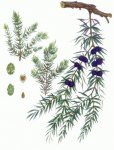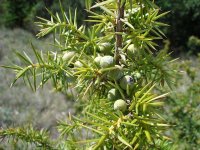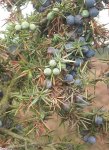Juniper - juniperus communis l.
Family Cypress (Cupressaceae).
Botanical characteristics. Refers to the family cypress. Evergreen coniferous shrub or small tree with a height of up to 3 m with flaky brownish bark. Leaves-needles are linear-sloped, are located whorls of 3 in each, keep on the branches for 4 years, covered with a wax coating. Dioecious plant, blooms in May. Staminate inflorescences ovate, pistillate - composed of small and large scales and free ovules. Fruits are pine cones, ripen in autumn next year, changing color from green to black.
Spread. The name juniper means "growing between spruce trees". Occurs in the undergrowth of spruce and pine forests, on felling and burning, on clayey and sandy soils.
Distributed in the northern and middle parts of the European part of Russia, in Western and Eastern Siberia.
Used parts of the plant. Ripe fruits (berries) and branches.
Chemical composition. In the fruit of juniper, many sugars (up to 40%), resins (about 9.5%), essential oils (up to 2%) of very complex composition, coloring substance Unipers, fatty oil, organic acids (apple, formic and acetic) are found. In the bark there are tannins, essential oils; In needles - ascorbic acid (about 266 mg%). Diterpenic alcohols are isolated from juniper wood.
Application.
Juniper berries have a tonic, tonic, antimicrobial, anti-inflammatory effect, have a distinct expectorant, laxative and strong diuretic effect.
They are used for asthenia, anemia, furunculosis, joint diseases, chronic skin diseases, metabolic diseases - cholelithiasis, kidney stones and gout. Berries of juniper are recommended for diseases of the liver and gastrointestinal tract.
Basically, juniper berries are used in diseases of the kidney and bladder (chronic nephritis, pyelonephritis, cystitis, stones and sand in the kidney and bladder, with acute and chronic urethritis). As a diuretic, juniper berries are used for swelling of various etiologies.
From the decoction of the branches of the plant make baths that are useful for inflammatory diseases of the joints (1 kg of raw material per bath).
Contraindications. In large doses and with prolonged use irritates the renal parenchyma, causes hematuria. Use with caution. In acute glomerulonephritis, juniper berries are contraindicated.
Preparation
- Infusion : cook at the rate of 2 teaspoons of berries for 1 cup of boiling water. Insist in a thermos, drink during the day for 1/3 cup for 20-40 minutes before eating.
- Decoction of juniper roots : 1 tbsp. L. Crushed dry roots pour 1 glass of water and boil for 20 minutes. They let them stand and filter. Take 1 tbsp. L. 3 times a day after meals with stomach ulcer, bronchitis.
- Decoction of juniper branches : 1 tbsp. L. Finely chopped branches pour 1 glass of water and boil for 5 minutes. Defend, filter and drink a third cup 3 times a day for allergies.
- Decoction of the pine cone of juniper : Dessert spoon of dry raw material is poured with 1 glass of water and boiled for 5 minutes. Insist 30 minutes, filter and drink for 1 - 2 tbsp. L. 3 times a day before meals with gout, rheumatism, tumors, diabetes mellitus.
- Tincture of pine cones of juniper : Dry or fresh pine cones are flooded with alcohol (70 °) in a ratio of 1:20 and insist a week in a dark place at room temperature. Filter and take 30 drops 3 times daily before meals with gout, tumors, rheumatism, diabetic polyneuritis.
- Use in raw form : With spring asthenia S. Kneipp recommends chewing juniper berries: on the first day 4 berries, in the following days add one berries a day to 15 pieces, after which gradually reduce one berries a day to the original four.





Comments
Commenting on, remember that the content and tone of your message can hurt the feelings of real people, show respect and tolerance to your interlocutors even if you do not share their opinion, your behavior in the conditions of freedom of expression and anonymity provided by the Internet, changes Not only virtual, but also the real world. All comments are hidden from the index, spam is controlled.